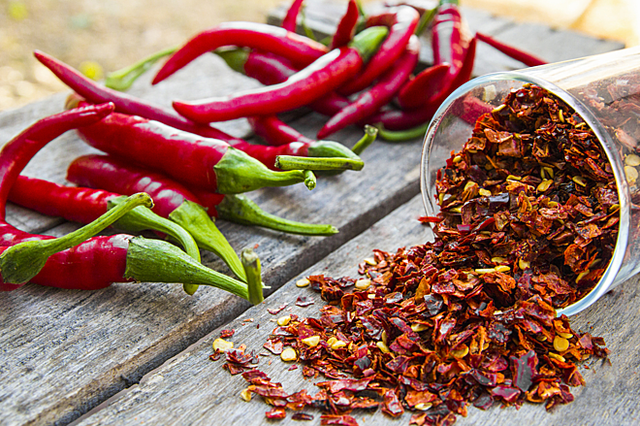Adding a little spice to every meal makes many people feel more delicious. Not many people know that eating spicy food in moderation also brings many health benefits.
Many people often think that spicy food will affect the digestive tract, especially causing stomach pain. Spicy food makes many people feel more delicious and stimulates eating, but not everyone knows the effects of spicy food on health.
1. Eating spicy foods can help you lose weight?
Eating spicy foods can help your body burn calories. It may sound strange, but it’s not too far-fetched. Many studies show that people who eat more spicy foods are less likely to be obese or gain weight.
Chili peppers and other spicy foods contain capsaicin, which acts on the hypothalamus, the part of the brain that controls hunger and satiety. So you may feel full sooner if you add a little spice to your meals. This can help you maintain or lose weight effectively.
A 2012 review of 20 studies found that capsaicin can help your body burn about 50 extra calories per day. The researchers concluded that this could lead to weight loss over a year or two, as part of a weight management program.

Eating spicy food in moderation has many health benefits.
2. Spicy Foods Improve Heart Health
Spicy foods can also improve overall heart health. Studies have found that spicy foods increase blood flow and lower blood pressure. In particular, the capsaicin in spicy foods also reduces inflammation, which is a risk factor for heart disease.
Spicy foods may also lower cholesterol, improve heart health, and reduce the risk of heart disease. A small 2017 study found that participants who took two 4 mg capsaicin capsules daily for three months had improved blood cholesterol levels compared to a control group.
Another 2017 study from the University of Vermont examined the link between heart health and red hot pepper consumption over six years. It found that participants who ate chili peppers had a 13% lower risk of death from causes such as heart disease or stroke.
3. Reduces Intestinal Inflammation
Spicy foods can also act as antioxidants, reduce inflammation, and aid digestion by fighting harmful bacteria that can lead to infection.
These benefits are especially helpful for those with irritable bowel syndrome, Crohn’s disease, or ulcerative colitis, which are associated with inflammation. However, it is important to consult your doctor and monitor how your body reacts to spicy foods before using them to treat other symptoms.
4. Spicy foods increase longevity
A large 2015 population study of Chinese adults found that people who consumed spicy foods every day had a 14% lower risk of premature death than those who consumed them once a week.
In addition, the same 2017 study from the University of Vermont found similar findings on longevity in the United States. However, experts say it’s important to remember that spicy foods are not a “magic wand” for health, but should be combined with a healthy diet and a consistent exercise routine.
5. Support the treatment of arthritis
The active ingredient capsaicin found in spicy foods can stimulate the brain to produce endorphins, which have pain-relieving effects and reduce symptoms caused by arthritis.
6. Harmful effects of eating too much spicy food to avoid
- Causes stomach pain: When eating too much spicy food, the stomach will be affected. In addition, the stronger the spiciness, the more severe the condition of gastric and duodenal ulcers becomes.
- Causes insomnia: When using chili or spicy spices in meals, it can cause the body temperature to increase, seriously affecting sleep during the day.
- Loss of appetite for natural foods: People who regularly use chili or spicy foods in their daily meals can overload the taste buds of the tongue, causing them to lose the ability to distinguish flavors. Therefore, you should not eat too spicy and often, only eat 2-3 times/week.
- Causes acne: Eating too spicy will irritate the skin, making it more prone to acne.
Note: For pregnant women, eating spicy food will affect both mother and baby. In particular, pregnant mothers who eat a lot of spicy food can cause allergies in children later or when the child is born, it is easy to have heat rash and heat in the body. Breastfeeding mothers are also advised not to eat too spicy food because the spicy concentration will pass through the milk and affect the child.





